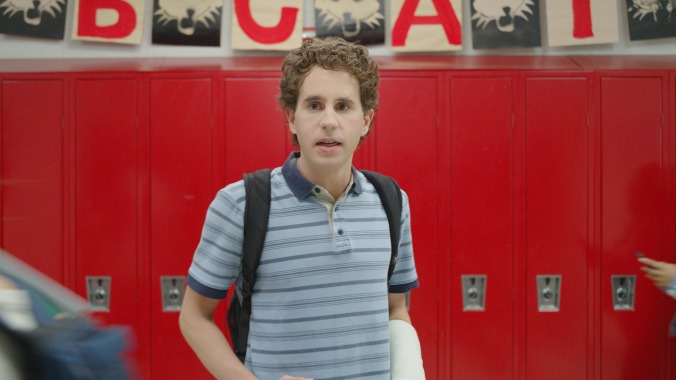Dear Evan Hansen is a misfire on just about every level
Into the emotional uncanny valley goes this maudlin adaptation of a beloved Broadway musical


As Ben Platt’s captivating performance in Netflix’s The Politician proved, there are times when casting a twentysomething as a teenager isn’t particularly distracting. The heightened worlds of darkly comedic satire and soapy high-school romance make it easy enough to roll with unrealistic casting choices—and that goes for stage musicals, too, where some level of artifice is built into the format. Unfortunately, one place where age-appropriate casting is kind of necessary is in an intimate teen drama that hinges entirely on the raw-nerve energy of its youthful lead to sell his character’s manipulative, cruel, selfish behavior as sympathetic rather than horrifying. While the filmmakers behind Dear Evan Hansen have maintained that their biggest motivation for adapting the popular Broadway musical was to immortalize Platt’s Tony-winning titular performance, what they’ve actually done by having the 27-year-old play a high school senior is highlight the stage show’s cavernous weaknesses while failing to transport just about any of its strengths to the new medium.
Now, could the film have been saved by casting an actual teen in the lead role? (Or at least by giving Platt a less distractingly desperate-to-look-young haircut?) It’s unclear. Questions of bad taste have hung around Dear Evan Hansen since it debuted on Broadway in 2016, though such qualms were mostly drowned out by praise for Platt’s visceral live performance and the catchy Broadway-by-way-of-Christian-rock tunes from wunderkind songwriters Benj Pasek and Justin Paul (who are also responsible for the toe-tapping numbers from The Greatest Showman). Like Rent before it, Dear Evan Hansen became an instant crossover sensation with young people. And as with Rent, perhaps that bubble was always going to burst sometime. It just didn’t have to burst in such a catastrophic way, via an adaptation that’s alternately baffling and cringeworthy, with only the occasional emotional highpoint for balance.
In giving Dear Evan Hansen the tone of a grounded indie drama, director Stephen Chbosky (The Perks Of Being A Wallflower) has lost the hook of seeing everyday suburban problems heightened to operatic musical theater proportions. All that’s left is a convoluted narrative that doesn’t feel like it particularly wants or needs to be a musical at all—the story of how socially anxious teen Evan Hansen (Platt) winds up posing, accidentally at first, as the best friend of Connor Murphy (Colton Ryan), a troubled school outcast who dies by suicide near the start of the film. The misunderstanding hinges on a contrived device: a letter that Evan writes himself as a therapy exercise, which falls into Connor’s hands and is subsequently mistaken for a suicide note.
Evan first passively encourages the lie that he and the deceased were close in order to bring peace to Connor’s devastated parents (Amy Adams and Danny Pino) and to their teenage daughter, Zoe (Kaitlyn Dever). But his manipulations become more active as the wealthy, supportive Murphy family start to offer him the sort of picture-perfect suburban life he’s never had with his hardworking single mom (Julianne Moore). Soon enough, Evan is faking elaborate email correspondence between himself and Connor, and turning his fake grief into viral fame with a memorial speech that becomes an internet rallying cry for mental health and suicide prevention. And Evan finds even less incentive to stop lying when Zoe, his lifelong crush, starts to return his affections the more time they spend together.
To be fair, Dear Evan Hansen knows that Evan is in the wrong—and so does Evan himself, who’s racked with guilt for most of the interminable 137-minute runtime. The problem is that the film doesn’t understand just how much he’s in the wrong, as it takes an uncomfortable “have it both ways” stance. We know Evan’s memorial speech is bogus, yet we’re still supposed to be swept up in his performance of “You Will Be Found,” a generically uplifting anthem about reaching out to others in times of need. In one painfully maudlin montage, thousands of comments flood the internet, praising the way Evan’s speech and Connor’s story saved their lives. So is the argument that all that social good justifies Evan’s manipulative means? Or is the film critiquing the way we all glom onto strangers’ tragedies in order to make ourselves feel like we’re part of something? And then there’s the way Evan gets close to Zoe by spinning stories about how much her brother idolized her, even as she describes her brother as a monster whose constant emotional abuse made her life a living hell—a dissonance the movie acknowledges and then does absolutely nothing with because it’s ultimately far more interested in Evan than Zoe.
It’s a shame, because in the brief instances when Dear Evan Hansen does work, it’s largely thanks to its talented female ensemble. Kaitlyn Dever is so effortlessly naturalistic as a grief-stricken teen that she almost makes the case that this should’ve been a gender-flipped adaptation starring her. Amy Adams finds some compelling moments of desperation beneath her character’s sunny suburban positivity. And Julianne Moore steals the film with her beautifully restrained performance of the 11 o’clock number “So Big/So Small,” a maternal love ballad that’s the one time Chbosky’s minimalist musical staging actually pays off. Elsewhere, the director struggles to jazz up his stilted blocking with clumsy montage cutaways, which are only effective in the upbeat, darkly funny number “Sincerely, Me,” in which Evan dreams up a dance-filled fantasy of his fake friendship with Connor.
Indeed, despite the heaviness of its subject matter, Dear Evan Hansen could’ve used more moments of lightness. The few times Platt’s performance actually works are when he leans into the more comedic, confident side of Evan—mostly because those are when Platt feels like he’s playing an actual character rather than just his character’s neuroses. For the most part, however, his hunched, twitchy, wide-eyed take doesn’t seem like a believable portrait of social awkwardness so much as just a forced, awkward performance. The smaller, more internal Platt tries to go, the bigger and more out of place he looks. To sell a story this troubling, you need a lead with enough charisma to paper over the flaws. And despite Platt’s impressive vocals, the magic he brought to his stage performance (and to so much of his previous screen work) is nowhere to be found here. Relatable in neither its bizarrely specific plotting nor its broadly generic emotions, Dear Evan Hansen is so self-serious that it almost plays like self-parody, only without any “so bad it’s good” fun. We may all be striving for human connection right now, but we’re unlikely to find any here.